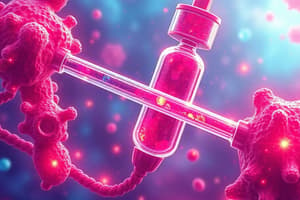Podcast
Questions and Answers
Which type of diabetes mellitus is characterized by autoimmune destruction of pancreatic beta cells?
Which type of diabetes mellitus is characterized by autoimmune destruction of pancreatic beta cells?
- Type 1 DM (correct)
- Type 4 DM
- Type 3 DM
- Type 2 DM
What is hyperinsulinemia?
What is hyperinsulinemia?
- Normal insulin levels in the blood
- Insufficient insulin in the blood
- Absence of insulin in the blood
- Excessive insulin in the blood (correct)
Which of the following is a life-threatening complication of diabetes characterized by elevated blood glucose, ketosis, and metabolic acidosis?
Which of the following is a life-threatening complication of diabetes characterized by elevated blood glucose, ketosis, and metabolic acidosis?
- Diabetic ketoacidosis (correct)
- Hypoglycemia
- Insulin resistance
- Hyperosmolar hyperglycemic syndrome
Which hormone has an antagonist relationship with insulin, promoting glycogen breakdown and glucose release into the blood?
Which hormone has an antagonist relationship with insulin, promoting glycogen breakdown and glucose release into the blood?
What is the role of incretins and DDP 4 inhibitors in the management of blood glucose?
What is the role of incretins and DDP 4 inhibitors in the management of blood glucose?
What is the primary difference between type 1 and type 2 diabetes mellitus?
What is the primary difference between type 1 and type 2 diabetes mellitus?
What characterizes hyperinsulinemia?
What characterizes hyperinsulinemia?
Which of the following is a life-threatening complication of diabetes characterized by severe hyperglycemia and dehydration leading to altered mental status?
Which of the following is a life-threatening complication of diabetes characterized by severe hyperglycemia and dehydration leading to altered mental status?
How does glucagon affect blood glucose levels?
How does glucagon affect blood glucose levels?
What is the main role of DPP-4 inhibitors in managing blood glucose levels?
What is the main role of DPP-4 inhibitors in managing blood glucose levels?
Which of the following hormones has an antagonist relationship with insulin, promoting glycogen breakdown and glucose release into the blood?
Which of the following hormones has an antagonist relationship with insulin, promoting glycogen breakdown and glucose release into the blood?
What is the primary difference in characteristics between diabetic ketoacidosis and hyperosmolar hyperglycemic syndrome?
What is the primary difference in characteristics between diabetic ketoacidosis and hyperosmolar hyperglycemic syndrome?
Which characteristic best describes amylin and its effect related to insulin?
Which characteristic best describes amylin and its effect related to insulin?
How does type 1 diabetes mellitus differ from type 2 diabetes mellitus in terms of pathophysiology?
How does type 1 diabetes mellitus differ from type 2 diabetes mellitus in terms of pathophysiology?
Which of the following characteristics correctly describes the action of incretins and DDP 4 inhibitors?
Which of the following characteristics correctly describes the action of incretins and DDP 4 inhibitors?
What is the primary difference between diabetic ketoacidosis and hyperosmolar hyperglycemic syndrome?
What is the primary difference between diabetic ketoacidosis and hyperosmolar hyperglycemic syndrome?
Which hormone has an antagonist relationship with insulin, promoting glycogen breakdown and glucose release into the blood?
Which hormone has an antagonist relationship with insulin, promoting glycogen breakdown and glucose release into the blood?
How does type 1 diabetes mellitus differ from type 2 diabetes mellitus in terms of pathophysiology?
How does type 1 diabetes mellitus differ from type 2 diabetes mellitus in terms of pathophysiology?
Which characteristic best describes incretins and DDP-4 inhibitors' action in managing blood glucose levels?
Which characteristic best describes incretins and DDP-4 inhibitors' action in managing blood glucose levels?
What characterizes hyperinsulinemia?
What characterizes hyperinsulinemia?
Which of the following best describes the biosynthesis of insulin?
Which of the following best describes the biosynthesis of insulin?
What is the primary function of amylin in relation to insulin?
What is the primary function of amylin in relation to insulin?
How does glucagon differ from insulin in its effect on blood glucose levels?
How does glucagon differ from insulin in its effect on blood glucose levels?
What best characterizes the relationship between diabetic ketoacidosis (DKA) and hyperosmolar hyperglycemic syndrome (HHS)?
What best characterizes the relationship between diabetic ketoacidosis (DKA) and hyperosmolar hyperglycemic syndrome (HHS)?
What role do incretins play in managing blood glucose levels compared to DDP-4 inhibitors?
What role do incretins play in managing blood glucose levels compared to DDP-4 inhibitors?
Flashcards are hidden until you start studying




